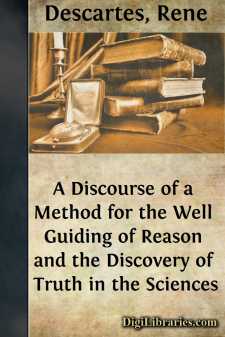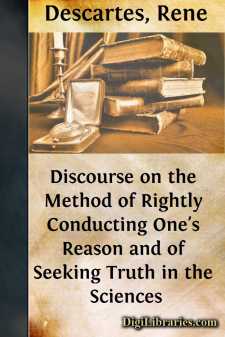Categories
- Antiques & Collectibles 13
- Architecture 36
- Art 48
- Bibles 22
- Biography & Autobiography 813
- Body, Mind & Spirit 142
- Business & Economics 28
- Children's Books 17
- Children's Fiction 14
- Computers 4
- Cooking 94
- Crafts & Hobbies 4
- Drama 346
- Education 46
- Family & Relationships 57
- Fiction 11829
- Games 19
- Gardening 17
- Health & Fitness 34
- History 1377
- House & Home 1
- Humor 147
- Juvenile Fiction 1873
- Juvenile Nonfiction 202
- Language Arts & Disciplines 88
- Law 16
- Literary Collections 686
- Literary Criticism 179
- Mathematics 13
- Medical 41
- Music 40
- Nature 179
- Non-Classifiable 1768
- Performing Arts 7
- Periodicals 1453
- Philosophy 64
- Photography 2
- Poetry 896
- Political Science 203
- Psychology 42
- Reference 154
- Religion 513
- Science 126
- Self-Help 84
- Social Science 81
- Sports & Recreation 34
- Study Aids 3
- Technology & Engineering 59
- Transportation 23
- Travel 463
- True Crime 29
Rene Descartes
René Descartes (1596–1650) was a French philosopher, mathematician, and writer, often referred to as the father of modern philosophy. He is best known for his philosophical statement "Cogito, ergo sum" ("I think, therefore I am") and for laying the groundwork for 17th-century rationalism. Descartes' works include "Meditations on First Philosophy" and "Discourse on the Method," both of which explore the nature of knowledge, doubt, and the relationship between mind and body. His contributions to mathematics include the development of Cartesian geometry, linking algebra and geometry.
Author's Books:
Sort by:
by:
Rene Descartes
PART. I. Right understanding is the most equally divided thing in the World; for every one beleevs himself so well stor’d with it, that even those who in all other things are the hardest to be pleas’d, seldom desire more of it then they have; wherein it is not likely that all Men are deceived: But it rather witnesseth, That the faculty of right-judging and distinguishing truth from falshood (which...
more...
by:
Rene Descartes
PART I Good sense is, of all things among men, the most equally distributed; for every one thinks himself so abundantly provided with it, that those even who are the most difficult to satisfy in everything else, do not usually desire a larger measure of this quality than they already possess. And in this it is not likely that all are mistaken the conviction is rather to be held as testifying that the...
more...



